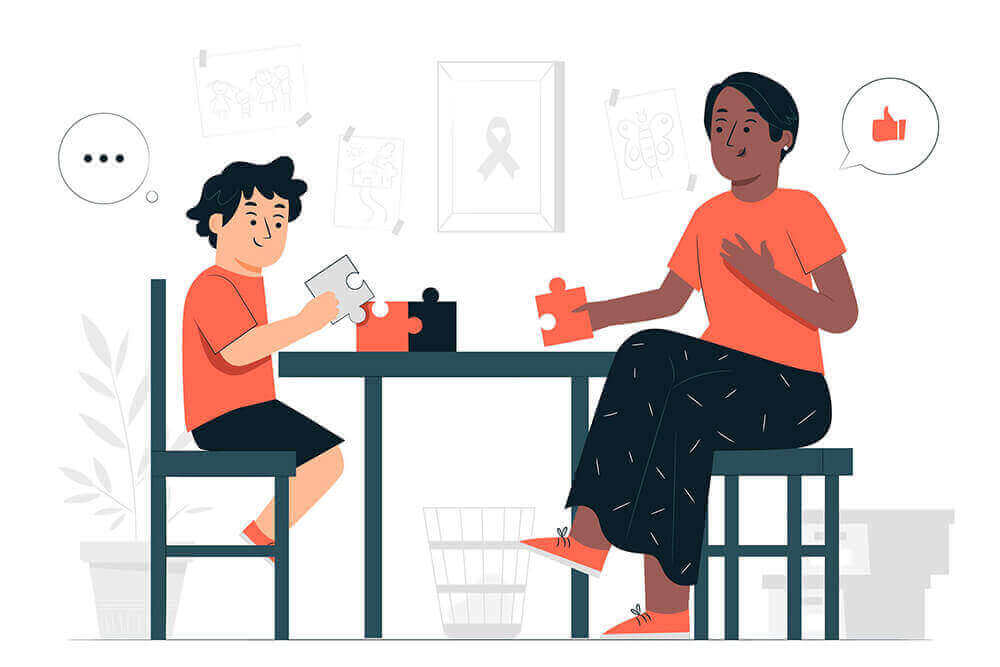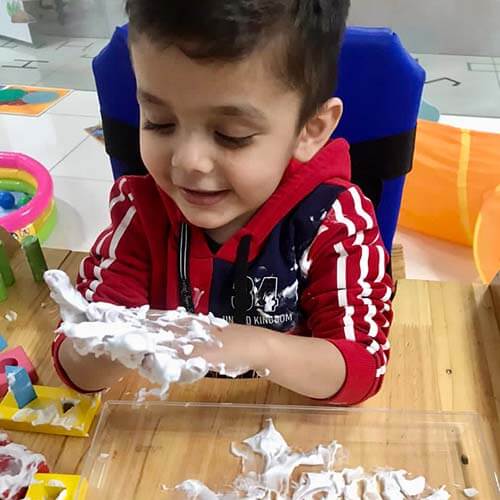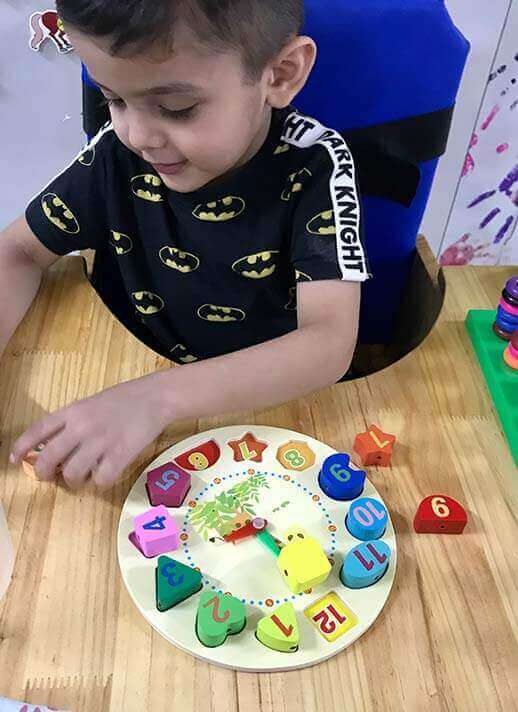Autism Therapy Consulting
Autism is an Ability Not a Disability!
Autism Spectrum Disorder
Autism is a lifelong neurodevelopment condition of the brain that affects how a person thinks, interacts with others, and experiences the world. Autism is described as a spectrum disorder as every autistic person is unique. Every individual falls on the spectrum differently as opposed to the other. Different individuals or kids with autism may have similar characteristics, but how they experience the condition differs. It is a developmental disability with an early onset.
Autism affects how a person responds and interacts with the world. It is a condition that impacts the individual’s behavioral, intellectual, emotional, and social-communicational abilities as well as motor skills. Early recognition, as well as behavioral, educational and Online Autism consultation may reduce symptoms and support development and learning. Irrespective of the spectrum-level, we wholeheartedly work with the parents to ensure children receive the required Online autism services, attention, support and education they deserve.

Our Autism Therapy Rajkot Team is Here to Help!
Early Intervention Better Outcomes
A developmental disorder that impairs the ability to communicate, Autism spectrum disorder affects the nervous system. It impacts the overall cognitive, emotional, social and physical development of the person. Individuals on different parts of that autism spectrum have diverse strengths and weaknesses. The range & severity of symptoms can vary widely and thus, our Online autism services Rajkot team helps to overcome them. If you know someone who has autism and they need autism therapy consulting doctors, we’ve got your back!

Occupational Therapy
Occupational therapy profiling gathers information regarding the medical history and areas of concern from caregivers as well as information about their habits and routines. Identify their interests and problem areas to improve participation and performance.
Sensory Integration
Sensory processing is the process of recognizing the sensations from our own body and the environment. This allows us to use our body effectively. Sensory integration is the way of improving the sensory processing in an individual. It prepares and teaches the kids and adults to easily understand and interpret the sensory experiences.
Reflex Integration
Reflexes are important for normal functioning of the body and for higher-level motor and cognitive skills. Primitive reflexes are not integrated if the development milestones are not met, and if the nervous system development is immature.
Signs of Autism

Behavioral
Inappropriate social interaction, poor eye contact, compulsive behaviour, impulsivity, repetitive movements, self-harm, or persistent repetition of words or actions.

Psychological
Difficulty and slowness in understanding themselves and others around them. Difficulty in processing and identifying emotions and how to regulate them.

Cognitive
Intense interest in a limited number of things or following the same pattern of activities regularly. Problem paying attention.

Developmental
Learning delay and speech delay.
If you see these signs in your child, feel free to reach out to Braintism’s Online Autism consultation India experts.
Signs to look out for Autism Consulting Doctors
Social Differences in Children with Autism
- Doesn't keep eye contact or makes very little eye contact
- Doesn't respond to a parent's smile or other facial expressions
- Doesn't look at objects or events a parent is looking at or pointing to
- Doesn't point to objects or events to get a parent to look at them
- Doesn't bring objects of personal interest to show to a parent
- Doesn't often have appropriate facial expressions
- Unable to perceive what others might be thinking or feeling by looking at their facial expressions
- Doesn't show concern (empathy) for others
- Unable to make friends or is uninterested in making friends

Communication Differences in Children with Autism
- Doesn't point at things to show needs or share things with others
- Doesn't say single words by 16 months of age
- Repeats exactly what others say without understanding the meaning (often called parroting or echoing)
- Doesn't respond to name being called but does respond to other sounds (like a car horn or a cat's meow)
- Refers to self as "you" and others as "I," and may mix up pronouns
- Often doesn't seem to want to communicate
- Doesn't start or can't continue a conversation
- Doesn't use toys or other objects to represent people or real life in pretend play
- May have a good rote memory, especially for numbers, letters, songs, TV jingles, or a specific topic
- May lose language or other social milestones, usually between the ages of 15 and 24 months (often called regression)
Behavioral Differences (Repetitive & Obsessive Behaviors) in Children with Autism
- Rocks, spins, sways, twirls fingers, walks on toes for a long time, or flaps hands (called "stereotypic behavior")
- Likes routines, order, and rituals; has difficulty with change or transition from one activity to another
- Obsessed with a few or unusual activities, doing them repeatedly during the day
- Plays with parts of toys instead of the whole toy (e.g., spinning the wheels of a toy truck)
- Doesn't seem to feel pain
- May be very sensitive or not sensitive at all to smells, sounds, lights, textures, and touch
- Unusual use of vision or gaze—looks at objects from unusual angles
About The Founder
About The Founder
Nishtha is a Special Educational Needs Consultant and a Psychotherapist who has graduated in Psychology from Royal Holloway University of London, UK. She then progressed her educational career by pursuing her post-graduation in Special and Inclusive Education from University College London – Institute of Education, UK.
Nishtha continues to work in various academic and non- academic settings offering customized multisensory intervention plans to children and young adults with learning difficulties and special needs.
As a consultant Nishtha works with parents and teachers delivering adequate information and providing guidance to better help children with their diagnoses.
Nishtha Shah
Founder of Braintism
Testimonials

Difficult to find an expert who can guide you in a proper and correct way to raise your kid and deal with the difficulties he/she is facing ... that’s what Nishthaa and the team Braintism does... Rajkot is very lucky to have you Nishthaa to guide and nurture our kids. The positive approach - the one to one consultations with us Parents and the various techniques bring about MIRACLES in kids’ lives... I consider myself extremely lucky and immensely proud that I had a student such as you... Please continue doing the excellent job that you are doing... Praying to God and thanking him to have such a faculty and such a facility in our city... THANK YOU AND GOD BLESS...

Jaydeep Shukla

One of the best clinic for counselling. I came here for my personal matter and import resolve within few days only just buy talk and by the suggestion. It is true that we have to implement, but it is for sure that we definitely get motivation to implement and get the solution. Best part, she has completed "PSYCHOLOGY" from London... Thank you Nishtha madam...

Dr. Manthan Thakkar

Nishtha at Braintism was exceptional in guiding my child for developing his speech in weak areas. She has an amazing place with latest amenities and toys for kids. My kid loved her sessions. Thank you and highly recommend.

Chandni Patel

I'm a young lady seeking help for all over wellbeing from Nishtha, and I have nothing to say else for it is just absolutely wonderful an experience being with her and the staff around! Aside from great efficacy and progress I am experiencing after the 6 sessions I have had with her, the atmosphere of the place and the warm nature of the people make it seem less like a clinic and more like a loving home. Perhaps I am yet to tell her this personally, but I have some very meaningful and thought-provoking talks with her, and wholeheartedly wish I was helping her through the start of this stupendous endeavor of hers. I would most definitely want to see anyone who is struggling in their mind to come and seek help in Braintism. She will try her level best to never disappoint, no matter what comes :))

Janya Govani
Copyright Braintism © All rights reserved